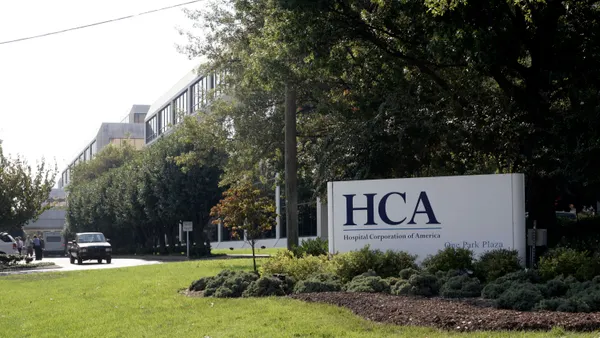Dive Brief:
- Hundreds of rural hospitals are at high risk of reducing services, converting to a different type of healthcare facility or closing their doors altogether if cuts to Medicaid under consideration in Congress pass, a group of Democrat senators said Thursday.
- The analysis found 338 rural hospitals were at risk of closure, conversion or service cutbacks because they care for a large share of Medicaid patients, have experienced three years of negative total margins or both, according to data released by the lawmakers.
- Nearly 20% of hospitals in Alabama with available data are in the highest risk category for financial distress, while 18% of rural facilities in Tennessee have seen three years of negative margins, according to the letter. “In short, many of these rural hospitals are facing financial instability today, even before any of the Republican health care cuts take effect,” the lawmakers wrote.
Dive Insight:
The House narrowly passed the reconciliation bill, called the One Big Beautiful Bill Act, in late May.
The legislation includes a number of healthcare provisions, including significant cuts to the safety-net insurance program Medicaid. Notably, it would mandate Medicaid beneficiaries log work, volunteer or education hours in order to stay enrolled in the coverage, as well increase the frequency of eligibility checks.
However, most enrollees already work, suggesting that those removed from the insurance would lose coverage due to the administrative burden of reporting requirements or unstable employment, experts say.
Nearly 11 million more people would be uninsured in 2034 if the reconciliation bill passes, according to the Congressional Budget Office. Almost 8 million would lose coverage due to the Medicaid provisions alone.
An increase in uninsured patients would also hit providers’ bottom lines, especially those that serve high numbers of Medicaid patients and rural hospitals — facilities that are likely already financially struggling, according to the data released by Sens. Edward Markey, D-Mass., Chuck Schumer, D-N.Y., Ron Wyden, D-Ore., and Jeff Merkley, D-Ore.
Rural hospitals across the country at risk if Medicaid cuts pass
Many of the more than 2,000 rural hospitals in the U.S. already face some financial distress, according to the Cecil G. Sheps Center for Health Services Research at the University of North Carolina at Chapel Hill, which conducted the analysis released by the Democrat lawmakers.
Eighty-three rural hospitals are at the highest relative risk of financial distress based on the researchers’ model, according to the letter.
Many rural providers serve a large share of Medicaid patients. For example, nearly a quarter of rural hospitals in West Virginia and the majority of rural facilities in Louisiana serve a high share of Medicaid beneficiaries. In Alaska and Kentucky, 44% of rural hospitals with available payer data serve a large portion of patients enrolled in the safety-net insurance.
“Addressing the crisis in rural health care access is a national, bipartisan priority, and it should be bipartisan to not worsen it,” the lawmakers wrote in the letter to President Donald Trump, Senate Majority Leader John Thune, R-S.D., and House Speaker Mike Johnson, R-La. “However, if your party passes these health care cuts into law, Americans in rural communities across the country risk losing health care services and jobs supported by their local hospitals.”
The letter is the latest volley in Democrats’ protest against the legislation, which they note would strip health insurance coverage from poor Americans to continue tax cuts that largely benefit the wealthy.
Republicans argue the bill preserves the safety-net insurance program for the most vulnerable, culling able-bodied people from the rolls and reducing fraud, waste and abuse.
However, some GOP lawmakers have raised concerns about the bill’s Medicaid policies, noting the cuts could hurt their own constituents. The bill is currently under consideration in the Senate, where its provisions could change.














